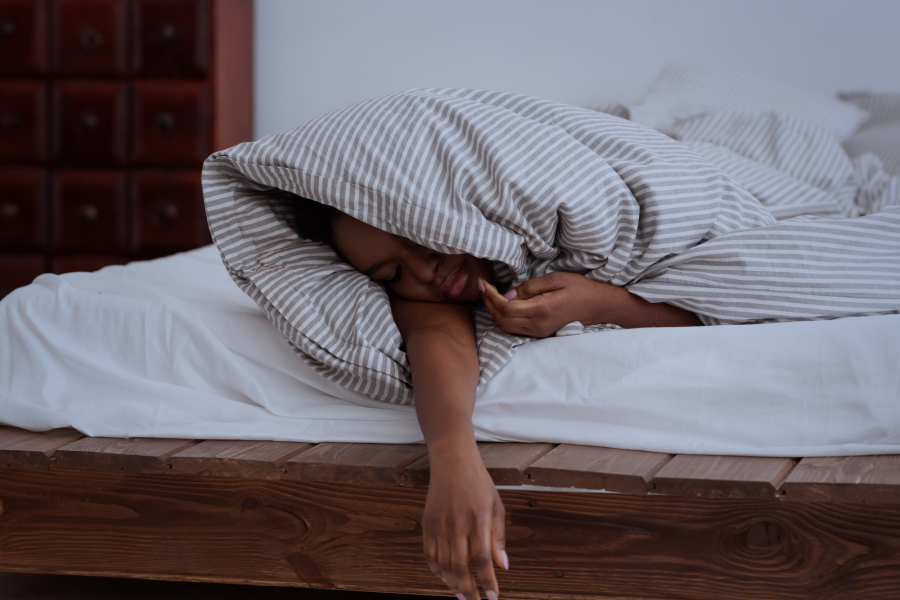Quality sleep fuels peak performance, supports recovery, and helps maintain steady energy throughout the day. Research also shows that it plays a critical role in focus, immune health, metabolism, and hormone balance.
We chatted with our TotalFusion Dietitian, Imi Houlahan
, about how nutrition can affect sleep, from the foods you eat to the timing of your meals. Combine that with a few simple changes to your routine, environment, and daily habits, and you can set yourself up for deeper, more restful sleep.
If you’re ready to sleep deeper and wake up stronger, here’s what science (and expert advice) says about improving your rest.
Sync With Your Circadian Rhythm
Your body runs on an internal clock, known as the circadian rhythm, which controls your sleep-wake cycle, hormone production, and energy levels throughout the day. When it’s functioning properly, your body naturally feels awake in the morning and starts winding down in the evening. However, irregular sleep patterns, artificial light, and late-night habits can disrupt this rhythm, making it harder to fall asleep and wake up feeling rested.
Get natural sunlight exposure early in the day. Morning light helps regulate melatonin production and keeps your body’s internal clock in sync.
Stick to a consistent sleep schedule. Going to bed and waking up at the same time (even on weekends) strengthens your natural sleep-wake cycle.
Limit blue light exposure at night. Artificial light from screens and LED bulbs can trick your brain into thinking it’s still daytime, delaying sleep onset.
By aligning your habits with your natural circadian rhythm, you can improve sleep quality, regulate energy levels, and wake up feeling more refreshed.
Fuel Your Body for Rest
TotalFusion Dietitian, Imi Houlahan highlights that what you eat and when you eat it plays a powerful role in how well you sleep. Nutrients support the production of neurotransmitters and hormones that influence your sleep-wake cycle, including melatonin and serotonin. Evening meals also help regulate your blood sugar and energy levels through the night, which can reduce restlessness and early wake-ups.
Prioritise sleep-supportive nutrients in your meals. Tryptophan, magnesium, calcium, vitamin B6, and zinc all support the body’s ability to relax and produce melatonin naturally.
Choose complex carbohydrates with your evening meal. Options like brown rice, oats, sweet potato, and wholegrain bread help maintain steady blood sugar levels throughout the night.
Avoid large, heavy meals or sugary snacks before bed. Overeating or consuming simple sugars too close to sleep can lead to discomfort or spikes and crashes in energy that disrupt your rest.
By focusing on nutrient-rich, balanced meals in the evening, you can support your body’s ability to fall asleep and stay asleep more easily.
Be Mindful of Stimulants & Sleep Disruptors
TotalFusion Dietitian, Imi Houlahan explains, even small afternoon and evening habits, particularly around caffeine and alcohol, can impact your sleep more than you think. Caffeine delays the onset of sleep by keeping the brain alert, while alcohol may help you fall asleep initially but reduces the quality of rest by disrupting REM sleep.
Limit caffeine after mid-afternoon. Stimulants like coffee, tea, energy drinks, and chocolate can remain in your system for hours, delaying your ability to wind down.
Be aware of hidden caffeine sources. Even decaf coffee, green tea, and pre-workout supplements can contain enough caffeine to affect your sleep cycle.
Avoid alcohol too close to bedtime. While it may help you feel sleepy, it interferes with deep and REM sleep stages, often leading to fragmented rest or early wake-ups.
Making a few changes to your afternoon and evening habits can improve your body’s ability to settle into deeper, more restorative sleep.
Support Sleep with Hydration
Imi also notes that hydration plays a quiet but important role in sleep quality. Dehydration can contribute to restlessness, dry mouth, and muscle cramps that make it harder to fall or stay asleep. Staying hydrated through the day, while easing off fluids before bed, supports a smoother night’s rest.
Stay hydrated throughout the day. Sip water regularly to maintain fluid balance and avoid cramping or restlessness at night.
Reduce fluid intake before bed. Drinking too much water close to bedtime can increase the likelihood of overnight bathroom trips, breaking your sleep cycle.
Use calming natural supports. Herbal teas like chamomile or valerian root can promote relaxation, and tart cherry juice contains natural melatonin that may support longer sleep duration.
Balancing fluid intake and incorporating natural relaxation tools can help ease your body into sleep without overstimulating your system.
Create a Calm and Comfortable Sleep Environment
Your bedroom sends signals to your brain about whether it’s time to rest or stay alert. Light, temperature, noise, and comfort all contribute to how easily your body can enter and maintain a deep, restorative sleep.
Keep the room cool and dark. A temperature around 18°C is ideal for sleep, and blackout curtains or a sleep mask can help block disruptive light.
Reduce sound and distractions. Consider using a fan or white noise machine to mask background noise, especially in busy households or apartments.
Invest in comfortable, breathable bedding. Lightweight fabrics and a supportive mattress can minimise tossing and turning, helping you stay asleep for longer.
A well-set-up sleep space can make it easier for your body to wind down and stay in deeper phases of rest through the night.
Build a Consistent Nighttime Routine
Your body doesn’t just switch off the moment your head hits the pillow. It needs a gradual transition from the activity of the day to a restful state. A familiar wind-down routine helps regulate melatonin and cortisol levels, signalling to your body that it’s time to slow down.
Avoid screens and bright lights in the hour before bed. Blue light from phones, TVs, and laptops can interfere with melatonin production and keep your brain in alert mode.
Incorporate calming rituals. Activities like reading, stretching, deep breathing, or a warm bath can activate the parasympathetic nervous system and promote relaxation.
Keep your routine consistent. Repeating the same steps each night helps your body recognise those cues and prepare for rest more efficiently.
Establishing a simple, calming routine creates a dependable bridge between your waking day and a good night’s sleep.
Exercise to Support Better Sleep
Movement benefits nearly every system in your body, and sleep is no exception. Regular exercise helps regulate circadian rhythms, reduce stress hormones, and increase your body’s need for deep, restorative sleep. But the timing and type of movement can influence how sleep-supportive it really is.
Aim for morning or early afternoon workouts. These help set your body clock and reduce the chance of overstimulation at night.
Use gentle movement at night if needed. Activities like walking, light yoga, or mobility work can help reduce physical tension and support a smoother transition to rest.
By moving at the right times and listening to your body, you can use exercise as a tool to support deeper, higher-quality sleep.
Start applying these sleep strategies tonight and notice the difference tomorrow.
This article was created in collaboration with TotalFusion Dietitian, Imi Houlahan.
“Sleep is the greatest life support system you could ever wish for. It’s a remarkable health insurance policy, it’s largely democratic, free and largely painless.” – Matt Walker


